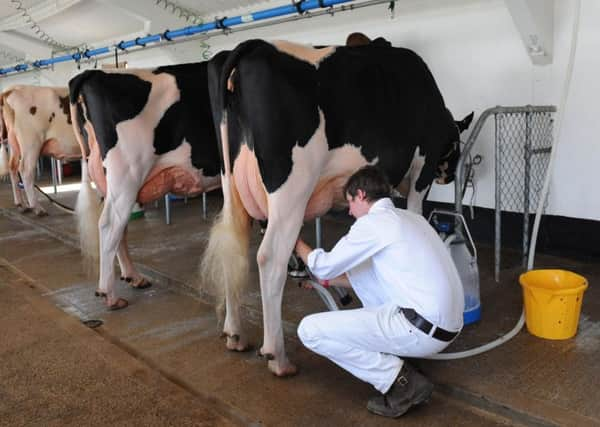YP Letters: No surprises in US threat to food rules


IT should come as no surprise that right-wing Brextremists and the US dairy industry are conspiring together to weaken food safety and environmental standards post-Brexit (George Eustice, The Yorkshire Post, February 27).
Lower quality American milk and dairy products from cows with udder infections could be forced on British consumers, if the US industrialised mega-farm dairy industry get their way.
Advertisement
Hide AdAdvertisement
Hide AdMeanwhile, a coalition of conservative think tanks, pushing for a free trade agreement which adopts weaker US standards, could result in chlorinated chicken and hormone-reared beef finding their way onto our menus.
For many right-wing Conservatives, Brexit has always been about tearing up EU standards on food safety, environmental protection and animal welfare, under the guise of freeing the UK from ‘red tape’. Which is why farmers are right to be sceptical of Michael Gove’s pledges on retaining high food, environmental and animal welfare standards.
Any trade agreement with the US which allows for the import of food and drugs produced without current EU standards and protections will threaten the viability of our small-scale farmers and food producers; they simply could not compete with the mega-farms and giant corporations of the US.
As the risks of a Tory Brexit become ever more apparent, Greens are stepping up our demand for a final say; a referendum on the deal between the UK and EU, with the option to retain all the protections that membership of the EU offers.
No need for pension panic
From: Dr Candida Spillard, Danum Road, York.
Advertisement
Hide AdAdvertisement
Hide AdGIVEN the often-quoted figure of a £5bn deficit in the University Superannuation Scheme (USS) pension fund, the case for reform might appear cut-and-dried.
However, the deficit figure is based on an assumption which is unrealistic for the 68 universities whose staff are enrolled in USS.
All workplace pension funds have periodically to produce a ‘valuation’ based on a ‘worst-case scenario’: liquidation of the firm, leaving only the pension fund and its liabilities – i.e. its obligation to pay people’s pensions. In the commercial world this makes perfect sense: the fates of BHS and Carillion show why. An independent actuarial analysis has shown the fund to be in surplus. It has a healthy proportion of younger contributors, meaning that it will remain in the black for at least 40 years. Its present form – ‘defined benefits’ – is proving workable and attractive. There is no real deficit, no ‘crisis’, and no need for the proposed switch to ‘defined contributions’.
Why we need train guards
From: Ann Logan, The Oval, Eaglescliffe, Stockton-on-Tees.
DURING a recent 14-minute rail journey from Allens West to Middlesbrough, I watched the guard help people safely get on and off the train: an elderly man in a wheelchair, a father with a baby carriage, and a mother with two children and a pushchair. He did all of this plus check the doors and take our tickets.
Advertisement
Hide AdAdvertisement
Hide AdThis Saturday, the rail union (RMT) is striking to protest the railway company’s plan to get rid of guards and make their trains ‘driver only’. Northern (part of a German state-owned company) makes good profits here in the UK. It stands to make more if it sheds the cost of guard salaries.
How many of Northern’s executives ride their own trains? If they did, even for just 14 minutes as I did, they would see that guards are key to passenger safety and an essential part of their business. Friends in Scotland tell me that the railway companies north of the border are keeping their guards after they negotiated with the RMT. It is time for Northern to sit down and talk to its guards in England.
Weather gives me the chills
From: Hugh Rogers, Messingham Road, Ashby.
UNLIKE some cynics, I am prepared to credit today’s professional weather forecasters with at least a passing knowledge of their science (The Yorkshire Post, February 26).
But I do wish they would stop using the term “feels like” when referring to temperatures. Assuming they are referring to the rather more technical term “wind chill”, surely how cold it feels depends on many different factors – how susceptible a person is, what clothes they are wearing and so on.
Advertisement
Hide AdAdvertisement
Hide AdPerhaps they should settle on a standard – say how it would feel if you were a woman of 45 walking on the Dales dressed only in a bikini. Then we would know where we were. Until then, I think I’ll stick to the old finger in the wind.
Can’t young get a grip?
From: Arthur Quarmby, Mill Moor Road, Meltham.
HAVE you noticed the strange way in which younger persons grip their pen or pencil?
We older ones held pen or pencil with thumb and two fingers. Young persons today all seem to use thumb and three fingers, which is far clumsier and offers less freedom of line or expression. Did this stem from the introduction of the ballpoint pen as opposed to the nib pen? But if so, why has the freedom to use a pencil also been lost?
KFC thanks
From: Guy Tindale, North Lincolnshire.
JUST a quick note to say Tom Richmond’s article on the KFC “crisis” was brilliant (The Yorkshire Post, February 24). A complete summing up of the country and the attitudes that prevail today. Many thanks.